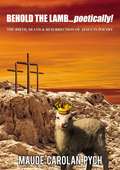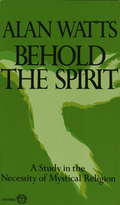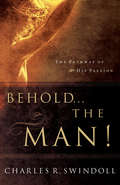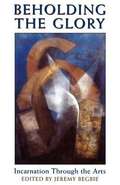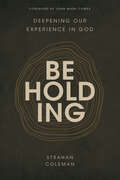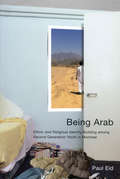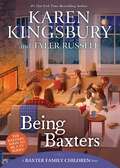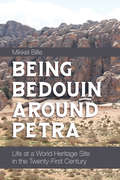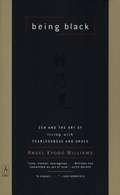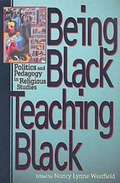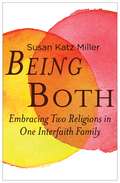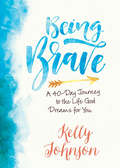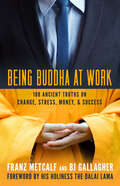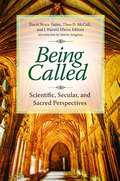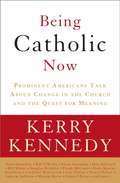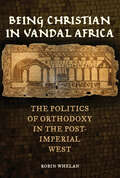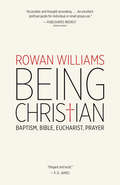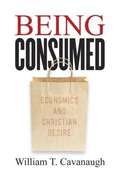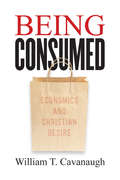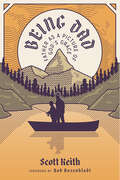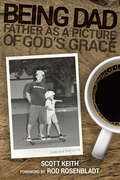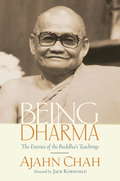- Table View
- List View
Behold the Lamb . . . Poetically!: The Birth, Death, and Resurrection of Jesus in Poetry
by Maude Carolan PychBehold the Lamb . . . Poetically! is a compilation of free verse, rhymes, and haiku that explores many diverse aspects of the birth, death and resurrection of Jesus. The poems have been written over a span of thirty years. They have been inspired by Scripture as well as personal experiences like pilgrimages, setting up the crèche, baking Christmas cookies, and solemnly reflecting upon the crucifixion on Good Friday afternoon.Many of the old familiar stories presented in this way will touch you afresh. Certain poems will lift your spirit and generate deep reflection or worship; others will re-kindle memories of observances from childhood. There are poems in this book that you will bookmark to re-read from time to time and some you&’ll want to share with family and friends. You might bring a favorite or two to a church meeting or copy one and tuck it into the envelope with a Christmas or Easter card.Most of all, these poems are intended to draw the reader into desiring a deeper relationship with Our Savior, Jesus, the Holy Lamb of God.
Behold the Man
by Michael MoorcockThe provocative classic of a traveler through time who discovers Christ the man--and is caught in the grip of an age-old prophecy!
Behold the Spirit: A Study in the Necessity of Mystical Religion
by Alan W. WattsThis study of the necessity of mystical religion, also shows how traditional Western doctrine can be reconciled with the intuitive religion of the Orient.From the Trade Paperback edition.
Behold... the Man!
by Charles SwindollThe truthful Man . . . falsely accused. The innocent Man . . . illegally tried and wrongly convicted. The gentle Man . . . who suffered punishment few could imagine, much less endure. The murdered Man . . . who forgave His own merciless killers. The divine Man . . . who died as a common criminal. The willing Man . . . who gave His life for others. The ordinary Man . . . who was, in fact, the extraordinary Son of God.The pathway Jesus took to the cross of Calvary is commonly called "the Passion." This sorrowful path weaved through soul-wrenching prayers and illicit deals made in shadowy darkness. It descended into corrupted courts bereft of justice and circled by prejudiced rulers stripped of power. On this pathway of His passion, Jesus paused for a torturous scourging and plodded on doggedly to a horrific death on a hillside called the Skull. But why?In this incredible, historically accurate account, you will come face to face with Jesus-the Man of Sorrows. If you're honest, you'll find the amazing answer to why . . . and you'll change. When you stop long enough to look, to think, to imagine, and to truly Behold the Man, you'll never be the same again.Chuck Swindoll leads us through a detailed examination of the events surrounding Jesus as he follows the winding pathway of his passion to the cross. This story-based investigation of the last week of Jesus's life-from the Last Supper to his death-focuses on "Why?" And in his Epilogue to this powerful, insightful book, Swindoll clearly explains to the unchurched and non-Christian reader why Jesus was willing to walk this sacrificial path to die-he did it for them.Releasing simultaneously with Mel Gibson's stirring movie The Passion of The Christ, Swindoll's book provides Christians an excellent evangelistic follow-up tool to give to their unchurched or non-Christian friends and families who see the film. As Chuck said after a private viewing of the movie, "You'll never be the same again." And Behold . . . the Man will help ensure that fact.
Beholding the Glory: Incarnation through the Arts
by Jeremy Begbie"Beholding the Glory looks at the incarnation, that is, the claim that God came to earth as a human being in Jesus Christ. Various art-forms - literature, poetry, dance, icons, sculpture, popular music and music in general - are allowed to provide their own insights into this central claim of the Christian faith. The idea is not that the mystery of the incarnation can be dissolved away, but that through the arts it is revealed in fresh and powerful ways that will resonate deeply within us." "Writing from different Christian traditions and as artists, academics, teachers and clergy, the contributors draw out a wealth of meaning in the belief that God entered our world as one of us."--BOOK JACKET. Title Summary field provided by Blackwell North America, Inc. All Rights Reserved
Beholding: Deepening Our Experience in God
by Strahan ColemanMove from a transactional experience with God to a transformational friendship with Him through prayer. How can time with God be a source of peace in a loud and distracting world? In Beholding, spiritual director and poet Strahan Coleman invites readers to discover the joy of being with God, not just working for Him. As they inhabit the art of resting in God&’s presence, prayer becomes not only a place of seeking, but becoming. Beholding calls Christians to understand how: Prayer is so much more than spoken conversation between us and God; it&’s a way of existing together. Beholding God in prayer is profoundly connected to beholding and dignifying others.Embracing prayer practices from different Christian traditions digs a deep well of peace in the soul.Our everyday ordinary lives can become the meeting place for God through silence, solitude, community, creation, and hospitality.
Being Arab
by Paul EidEid looks at the significance of religion to ethnic identity building, a largely understudied issue in ethnic studies, and the extent to which social and cultural practices are structured along ethnic and religious lines. Being Arab also analyzes whether gendered traditions act as identity markers for young Canadians of Arab descent and whether men and women hold different views on traditional gender roles, especially regarding power within romantic relationships and sexuality.
Being Arab: Ethnic and Religious Identity Building among Second Generation Youth in Montreal (McGill-Queen's Studies in Ethnic History #110)
by Paul EidEid looks at the significance of religion to ethnic identity building, a largely understudied issue in ethnic studies, and the extent to which social and cultural practices are structured along ethnic and religious lines. Being Arab also analyzes whether gendered traditions act as identity markers for young Canadians of Arab descent and whether men and women hold different views on traditional gender roles, especially regarding power within romantic relationships and sexuality.
Being Baxters (A Baxter Family Children Story)
by Karen Kingsbury Tyler RussellIn the fifth book in Karen Kingsbury and Tyler Russell&’s beloved series about the Baxter children, when things don&’t turn out according to plan, the siblings must stick together and remember who they are.Things are changing in Bloomington for the Baxters. When Ashley&’s teacher, Mr. Garrett, takes a month off work for the birth of his baby, the intimidating Ms. Stritch takes his place. Ashley tries but can&’t seem to crack the new teacher&’s tough exterior. Meanwhile, Brooke struggles when a popular girl excludes her at lunch, Erin adjusts to getting glasses, and when Kari is given a dance solo for the upcoming recital, she takes her success a little too seriously. When Principal Bond announces a new Character Awards initiative, competition breaks out between siblings and friends, until the students forget the point of the awards. Through it all, the town prepares for a major blizzard that Luke worries will cancel his class&’s field trip to see the Harlem Globetrotters. With so many obstacles in their lives, the Baxter Children have the opportunity to remember what being Baxters really means.
Being Bedouin Around Petra: Life at a World Heritage Site in the Twenty-First Century
by Mikkel BillePetra, Jordan became a UNESCO World Heritage site in 1985, and the semi-nomadic Bedouin inhabiting the area were resettled as a consequence. The Bedouin themselves paradoxically became UNESCO Masterpieces of Oral and Intangible Heritage in 2005 for the way in which their oral traditions and everyday lives relate to the landscape they no longer live in. Being Bedouin Around Petra asks: How could this happen? And what does it mean to be Bedouin when tourism, heritage protection, national discourse, an Islamic Revival and even New Age spiritualism lay competing claims to the past in the present?
Being Bedouin Around Petra: Life at a World Heritage Site in the Twenty-First Century
by Mikkel BillePetra, Jordan became a UNESCO World Heritage site in 1985, and the semi-nomadic Bedouin inhabiting the area were resettled as a consequence. The Bedouin themselves paradoxically became UNESCO Masterpieces of Oral and Intangible Heritage in 2005 for the way in which their oral traditions and everyday lives relate to the landscape they no longer live in. Being Bedouin Around Petra asks: How could this happen? And what does it mean to be Bedouin when tourism, heritage protection, national discourse, an Islamic Revival and even New Age spiritualism lay competing claims to the past in the present?
Being Black
by Angel Kyodo WilliamsBeing Black has gained an enthusiastic following in African American and Zen communities. Angel Kyodo Williams shows black Americans how to develop a "warrior-spirit" of truth and responsibility that can lead to happiness and personal transformation. The principles and tools she offers provide a framework for addressing the African American community's unique worries, hopes, challenges, and expectations. Williams uses an eloquent, hip, and honest approach to share personal stories, time-tested teachings, and simple guidelines that invite readers of all faiths to discover how to step into the freedom of a life lived with fearlessness, grace, and fluidity.
Being Black, Teaching Black: Politics and Pedagogy in Religious Studies
by Nancy Lynne WestfieldIn this volume a group of eminent African American scholars of religious and theological studies examine the problems and prospects of black scholarship in the theological academy. They assess the role that prominent black scholars have played in transforming the study and teaching of religion and theology, the need for a more thorough-going incorporation of the fruits of black scholarship into the mainstream of the academic study of religion, and the challenges and opportunities of bringing black art, black intellectual thought, and black culture into predominantly white classrooms and institutions.
Being Both: Embracing Two Religions in One Interfaith Family
by Susan Katz MillerA book on the growing number of interfaith families raising children in two religions Susan Katz Miller grew up with a Jewish father and Christian mother, and was raised Jewish. Now in an interfaith marriage herself, she is a leader in the growing movement of families electing to raise children in both religions, rather than in one religion or the other (or without religion). Miller draws on original surveys and interviews with parents, students, teachers, and clergy, as well as on her own journey, in chronicling this grassroots movement. Being Both is a book for couples and families considering this pathway, and for the clergy and extended family who want to support them. Miller offers inspiration and reassurance for parents exploring the unique benefits and challenges of dual-faith education, and she rebuts many of the common myths about raising children with two faiths. Being Both heralds a new America of inevitable racial, ethnic, and religious intermarriage, and asks couples who choose both religions to celebrate this decision.
Being Brave: A 40-Day Journey to the Life God Dreams for You
by Kelly Johnson"For God gave us a spirit not of fear but of power and love and self-control." (2 Timothy 1:7 ESV)God has made us brave, not fearful beings. In a forty-day devotional format, author and blogger Kelly Johnson invites you to consider a new way of thinking about what it means to be brave and challenges you to seek a greater intimacy with God and the people God has placed in your life. Through Scripture, stories, prayers, and thought-provoking questions, you will recognize the seeds of divinely inspired bravery and learn the strength found in community. Using letters of the word brave as a guide, Being Brave highlights what God’s Word has to say about the characteristics of bravery: Bold, Resilient, Authentic, Vulnerable, and Engaged and Empowered by the Spirit. Banish the fear that holds you back. You are a brave soldier!
Being Buddha at Work: 108 Ancient Truths on Change, Stress, Money, and Success
by Franz Metcalf BJ GallagherBuddhism has for thousands of years provided a spiritual foundation for the daily lives of millions of people around the world. But does Buddhism have anything to offer us—Buddhists and non-Buddhists alike—in today’s world of work? Metcalf and Gallagher think it does. Spiritual wisdom, Western or Eastern, inspires and instructs us in living a good life. And that’s just as true at work as at home. Buddha mind—a source of calm, compassion, and insight—exists within each of us, not just the historical Buddha. Being Buddha at Work shows how to embody that mind in the stress and clamor of the workplace—how to tap into the Buddha consciousness so we can relieve daily tensions and greet challenges with awareness, equanimity, and good humor. The book is divided into three sections. The first, “Becoming a Mindful Worker,” covers Buddha’s wisdom for our own work; the second, “Cultivating Mindful Work Relationships,” focuses on how to work with other people; the third, “Creating a Mindful Workplace,” deals with broader organizational topics. There is wisdom here for everyone—from frontline workers and team members, to supervisors and managers, to top executives and organizational leaders.
Being Called: Scientific, Secular, and Sacred Perspectives
by J. Harold Ellens David Bryce Yaden Theo D. McCallThis unique book is an essential resource for interdisciplinary research and scholarship on the phenomenon of feeling called to a life path or vocation at the interface of science and religion. Drawing upon the collective knowledge and insight of expert authors from Australia, China, Eastern Europe, Italy, the UK, and the United States, the work provides a comprehensive examination of the topic of callings suitable for collegiate students, professors, and professional scholars interested in topics at the interface of science and religion. It will also benefit general readers seeking the expertise of psychologists, neuroscientists, and theologians from various backgrounds and worldviews who explain why it is important to "do what you were meant to do."
Being Catholic Now: Prominent Americans Talk About Change in the Church and the Quest for Meaning
by Kerry KennedyFor Kerry Kennedy, who grew up in a devoutly Catholic household coping with great loss, her family’s faith was a constant source of strength and solace. As an adult, she came to question some of the attitudes and teachings of the Catholic Church while remaining an impassioned believer in its role as a defender of the poor and oppressed. “Generations ago,” says Kennedy, “the search for spirituality came predefined and prepackaged. [The Church] not only gave us all the answers, it even gave us the questions to ask. ” Now many of the old certainties are being reexamined. In an attempt to convey this sea change, Kennedy asked thirty-seven American Catholics to speak candidly about their own faith—whether lost, recovered, or deepened—and about their feelings regarding the way the Church hierarchy is moving forward. The voices included here range from respectful to reproachful and from appreciative to angry. Speaking their minds are businesspeople, actors and entertainers, educators, journalists, politicians, union leaders, nuns, priests—even a cardinal. Some love the Church; some feel intensely that the Church wronged them. All have an illuminating insight or perspective. Kerry Kennedy herself speaks of the joy of growing up as one of Robert and Ethel Kennedy’s eleven children, of the tragedies that eventually befell her family, and of how religion was deeply woven through good times and bad. Journalist Andrew Sullivan talks about reconciling his devout Catholicism with the Church’s condemnation of his identity as a gay man. TV newswoman Cokie Roberts recalls the nuns who taught her and “took girls seriously when nobody else did. ” Comedian Bill Maher declares, “I hate religion. It’s the worst thing in the world”—and goes on to defend his bold assertion. Writer Anna Quindlen depicts a common parental challenge: passing along traditions and values to a younger generation sometimes deaf to spiritual messages. Through these and many other voices that speak not only to Catholics but to all of us,Being Catholic Nowredefines an ancient institution in the most contemporary of terms. From Being Catholic Now “When my mom asked if I wanted to be a nun, I said I’d rather be a priest. . . . The nuns were always wonderful, but the power was with the priest. ” —Nancy Pelosi “There are aspects of studying the saints, with the candles, incense, and Latin Masses and some of the pageantry of the Church that, as an American historian, make me feel part of a larger wave of history. That it’s not a newfangled religion, which some people get great solace from. I feel that I’m connected to places. ” —Douglas Brinkley “Faith isn’t like picking courses off a menu. It’s a journey, and it’s a path. If your path and journey have been within one structure your entire life, then simply leaving isn’t an option. ” —Andrew Sullivan “Why stay Catholic? Because the hierarchy is not the Church. . . . We [the people of God] are the Church. They can’t take that away from us. ” —Cokie Roberts “I was told very early on by the nuns that I had an ‘overabundance of original sin. ’ I was a quiet kid, but I was curious. I asked the wrong questions. ” —Susan Sarandon “I don’t believe you can be authentically Catholic without being committed to the social doctrine of the Church. When I was in grammar school, we had these little boxes to help the poor. That was good, but that is half of it. The other half is to find out why there are so many poor people and how we can do so
Being Christian in Vandal Africa: The Politics of Orthodoxy in the Post-Imperial West (Transformation of the Classical Heritage #59)
by Robin WhelanBeing Christian in Vandal Africa investigates conflicts over Christian orthodoxy in the Vandal kingdom, the successor to Roman rule in North Africa, ca. 439 to 533 c.e. Exploiting neglected texts, author Robin Whelan exposes a sophisticated culture of disputation between Nicene (“Catholic”) and Homoian (“Arian”) Christians and explores their rival claims to political and religious legitimacy. These contests—sometimes violent—are key to understanding the wider and much-debated issues of identity and state formation in the post-imperial West.
Being Christian: Baptism, Bible, Eucharist, Prayer
by Rowan WilliamsIn this simple, beautifully written book Rowan Williams explores four essential components of the Christian life: baptism, Bible, Eucharist, and prayer. Despite huge differences in Christian thinking and practice both today and in past centuries, he says, these four basic elements have remained constant and indispensable for the majority of those who call themselves Christians.In accessible, pastoral terms Williams discusses the meaning and practice of baptism, the Bible, the Eucharist, and prayer, inviting readers to really think through the Christian faith and how to live it out. Questions for reflection and discussion at the end of each chapter help readers to dig deeper and apply Williams's insights to their own lives.
Being Consumed: Economics and Christian Desire
by William T. CavanaughShould Christians be for or against the free market? For or against globalization? How are we to live in a world of scarcity? William Cavanaugh uses Christian resources to incisively address basic economic matters - the free market, consumer culture, globalization, and scarcity - arguing that we should not just accept these as givens but should instead change the terms of the debate. Among other things, Cavanaugh discusses how God, in the Eucharist, forms us to consume and be consumed rightly. Examining pathologies of desire in contemporary "free market" economies, Being Consumed puts forth a positive and inspiring vision of how the body of Christ can engage in economic alternatives. At every turn, Cavanaugh illustrates his theological analysis with concrete examples of Christian economic practices.
Being Consumed: Economics and Christian Desire
by William T. CavanaughShould Christians be for or against the free market? For or against globalization? How are we to live in a world of scarcity? William Cavanaugh uses Christian resources to incisively address basic economic matters -- the free market, consumer culture, globalization, and scarcity -- arguing that we should not just accept these as givens but should instead change the terms of the debate.Among other things, Cavanaugh discusses how God, in the Eucharist, forms us to consume and be consumed rightly. Examining pathologies of desire in contemporary "free market" economies, Being Consumed puts forth a positive and inspiring vision of how the body of Christ can engage in economic alternatives. At every turn, Cavanaugh illustrates his theological analysis with concrete examples of Christian economic practices.
Being Dad: Father As A Picture of God's Grace
by Scott Leonard Keith Rod RosenbladtEvery person is born with a deep longing for a father. Being Dad deals with the way fathers, and the subject of biblical fatherhood, are treated in modern culture. Dr. Keith brings his experience with family, students, great mentors, and friends to bear on a subject that is crying out for attention. Equally, he brings his Christian faith, a scholarly eye for detail, and an ear for story along on the journey and works with the reader to navigate a path to a better country where the Father blesses His children and is honored.Forgiven fathers are a gift from God, for they have the gospel to proclaim to their families. This approach leads to gracious fathers that can now display a shadow of the love of their Heavenly Father so that children may be drawn into saving faith.
Being Dad: Father as a Picture of God's Grace
by Scott Leonard KeithThis book deals with the way fathers, and the subject of fatherhood, are treated in modern culture. Dr. Keith brings his experience with family, students, great mentors and friends to bear on this subject which is crying out for attention. Equally, he brings his Christian faith, a scholarly eye for detail and an ear for story along on the journey and works with the reader to navigate a path to a better country where the Father blesses His children and is honored.
Being Dharma: The Essence of the Buddha's Teachings
by Jack Kornfield Ajahn ChahChah offers a thorough exploration of Theravadan Buddhism in a gentle, sometimes humorous, style that makes the reader feel as though he or she is being entertained by a story. He emphasizes the path to freedom from emotional and psychological suffering and provides insight into the fact that taking ourselves seriously causes unnecessary hardship.Ajahn Chah influenced a generation of Western teachers: Jack Kornfield, Sharon Salzberg, Sylvia Boorstein, Joseph Goldstein, and many other Western Buddhist teachers were at one time his students. Anyone who has attended a retreat led by one of these teachers, or read one of their books, will be familiar with this master's name and reputation as one of the great Buddhist teachers of this century.
